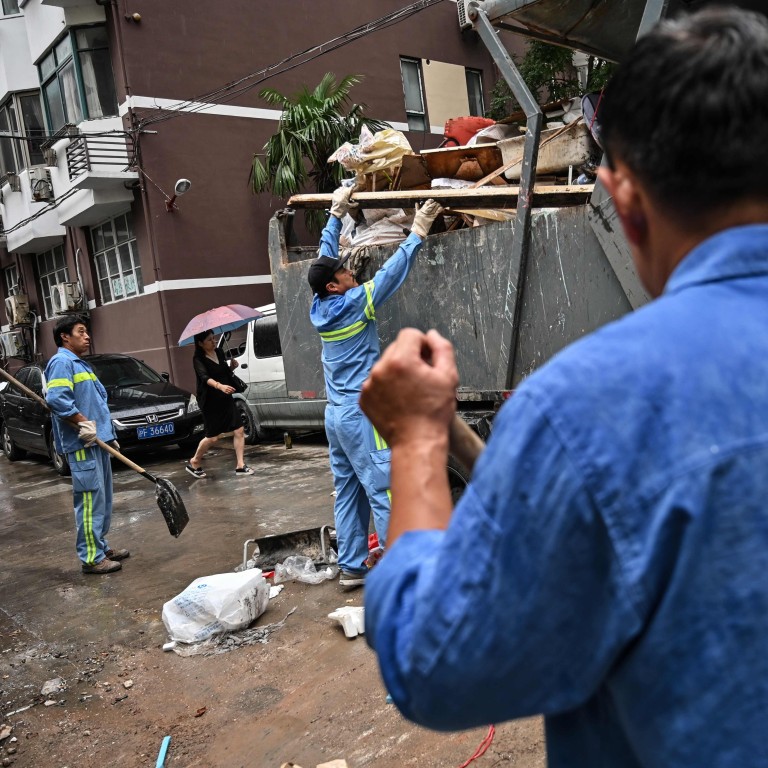
China’s war on trash goes hi-tech with AI-driven apps for sorting and facial recognition to enforce recycling
- Alipay’s mini program has indexed more than 4,000 different types of waste and has assisted more than three million people since its beta test phase
Chinese consumers are spoiled with apps for just about everything they need to do in daily life – and that now includes sorting trash.
After Shanghai residents complained about the difficulty in sorting waste into four categories under a new rule that came into effect July 1, China’s biggest internet companies jumped in with apps to help out.
Residents who fail to follow the new rules – which require waste to be binned according to four categories of biodegradable, dry, toxic and recyclable – face hefty fines and a possible reduction in their social credit scores.
Tencent, which operates the ubiquitous messaging app WeChat, introduced a mini-program, Master of Trash Sorting, for users in the cities of Beijing, Shanghai, Shenzhen and Guangzhou, which instructs them how waste should be sorted and disposed of based on key words.
Alipay, the financial arm of Alibaba, owner of the South China Morning Post, announced earlier that it had deployed its artificial intelligence and augmented reality technologies to a mini program for waste sorting in Shanghai and other cities in China. Users scan waste items using cameras on their smartphones to learn which category the rubbish belongs to.
Stumped by Shanghai’s recycling rules? There’s hundreds of apps for that
Alipay said the mini program, which has indexed more than 4,000 different types of waste to date, has assisted more than three million people since its beta test phase in early July. Alipay also launched another mini program that enables people in 16 cities across China to sell recyclable waste from their homes.
Not to be outdone, Alibaba’s e-commerce rival JD.com said it provides AI-backed image recognition technologies so that businesses can sort their garbage. Users ask a smart speaker questions like “What kind of garbage is this?” and “How do I recycle this item?”
With more than 1.3 billion people, China is the world’s second-biggest producer of trash after the United States but repeated calls for better trash sorting have led to little progress over the past decade.
Shanghai, the second most populous city in the country, has taken the initiative to introduce strict trash sorting and recycling rules to try and emulate the success of similar policies in Japan and Taiwan.
The recycling trend has also caught the attention of Chinese games start-ups. A 15-second video of a trash-sorting virtual reality game, developed by tech start-up VitrellaCore, went viral on Chinese social media recently.
The game debuted at the Mobile World Congress in Shanghai last month where long queues of visitors waited to try it, according to a report from state-run media Xinhua.
Wearing VR goggles, players can see different types of trash and a series of recycling bins. Points are scored when the trash is recycled into the appropriate bins.
In Beijing, trash bins with facial recognition system have been installed in some residential areas to identify who is disposing of the rubbish. Residents who place the trash into the correct recycling bins can earn more social credit scores, according to a video post on social media platform Weibo.
Chinese users befuddled by the practice can look to neighbouring Japan, where meticulous sorting of rubbish is a rite of passage for many newcomers. The right kind of trash has to be placed in the right coloured bag and put out on the right collection day – or residents risk being shamed by having it returned, or in extreme cases, face eviction by order of the neighbourhood garbage sorting enforcer.
However, Japan is developing technology solutions – just not the app kind – to improve its trash collection and disposal, including more efficient waste transport, automatic incineration, safe methods of home appliance recycling, and landfill disposal technology that can stabilise waste in a shorter period of time
Taiwan has one of the world’s highest recycling rates, with nearly 60 per cent of its waste between January and October last year being recycled, according to the Taipei government.
Additional reporting by Zen Soo

